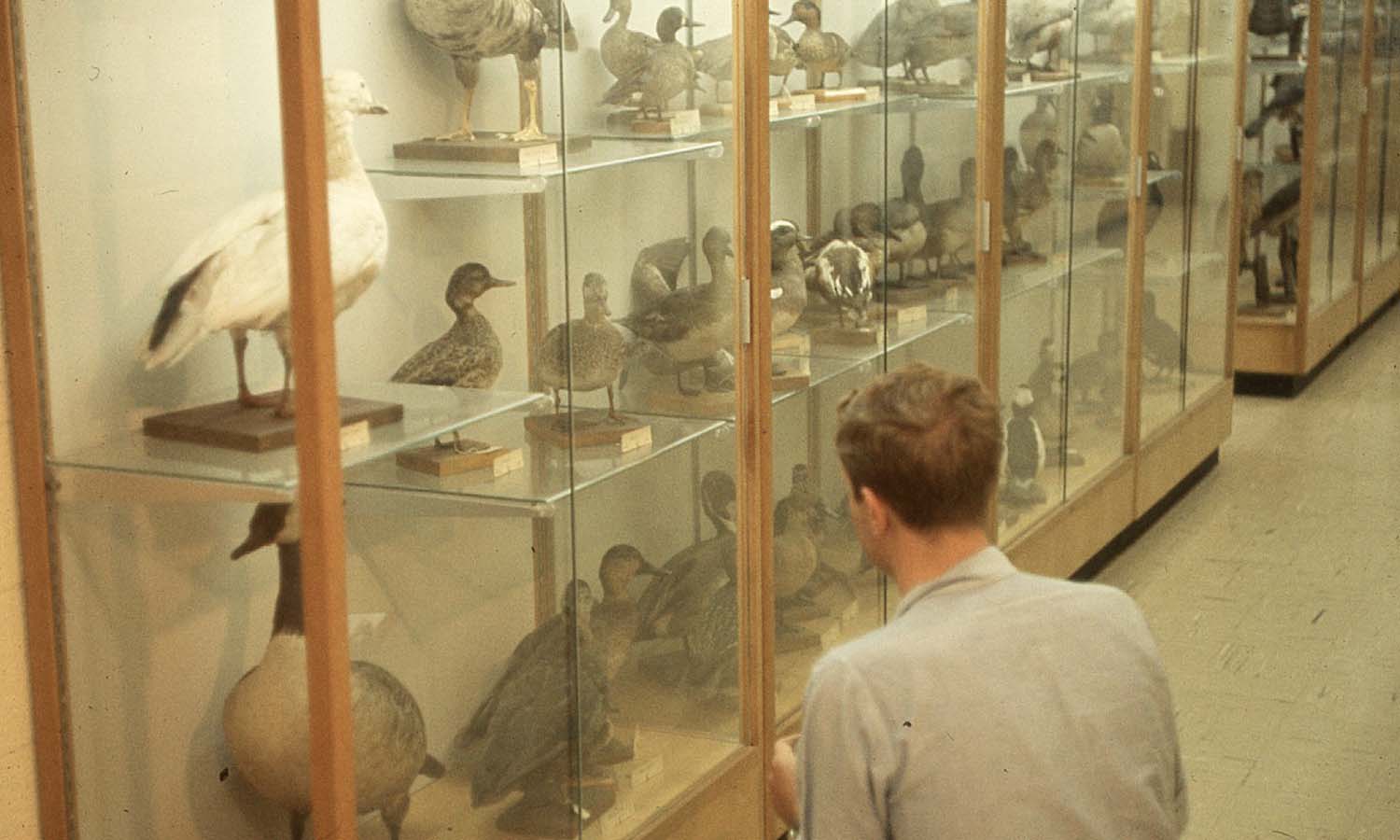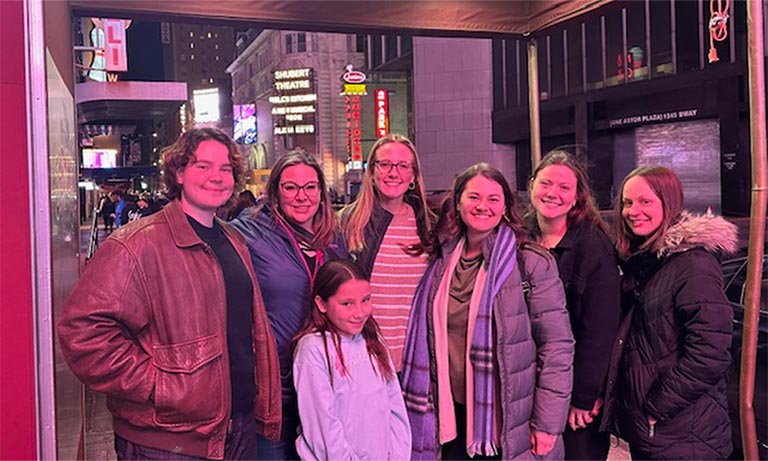
HWS News
15 April 2025 • Research HWS Presents at the 96th Annual Meeting of the Eastern Psychological Association
Student-Faculty research explores the influence of medical and mindfulness practices on mental health and behavioral outcomes. Following graduation, Lauren Legler '25 will pursue a master's degree in Occupational Therapy from McGill University.
Last month, Lauren Legler ’25, Lindsay Ringbloom ’25 and Payton Kliesch ’25 joined Professor and Chair of Psychological Science Jamie Bodenlos and Assistant Professors of Psychological Science Stephanie Anglin and Elizabeth Belcher in presenting research at the 96th Annual Meeting of the Eastern Psychological Association in New York City.
The students presented research gathered during independent study projects and co-authored with their guiding professors during the conference’s poster sessions. Legler presented “Effect of Meditation on Resisting Cell Phone Distractions,” Ringbloom presented “Cognitive Fusion Mediates Mindfulness and Emotional Well-being in College Students,” and Kliesch presented her research “Mental Health Outcomes in Patients Treated with Chimeric Antigen Receptor T-cell Therapy."
The 2025 conference theme “Making positive changes in people’s lives and in the world” highlighted the ways that students, faculty and professionals are using research, teaching and service to strengthen communities and promote well-being.
Anglin presented results from her co-authored paper “Personality Stability and Change Across the Academic Semester” with colleagues at Arizona State and Towson Universities.
“We tested competing theories of personality change across the semester and experiences associated with these changes. We found that conscientiousness, agreeableness and openness decreased over the semester, and these changes co-occurred with declines in subjective well-being, social support and health behaviors. In contrast to prior research showing personality maturity over the college years, we observed declines in traits associated with maturity over the semester, suggesting that students must adapt to new challenges and expectations before growing from them,” says Anglin.
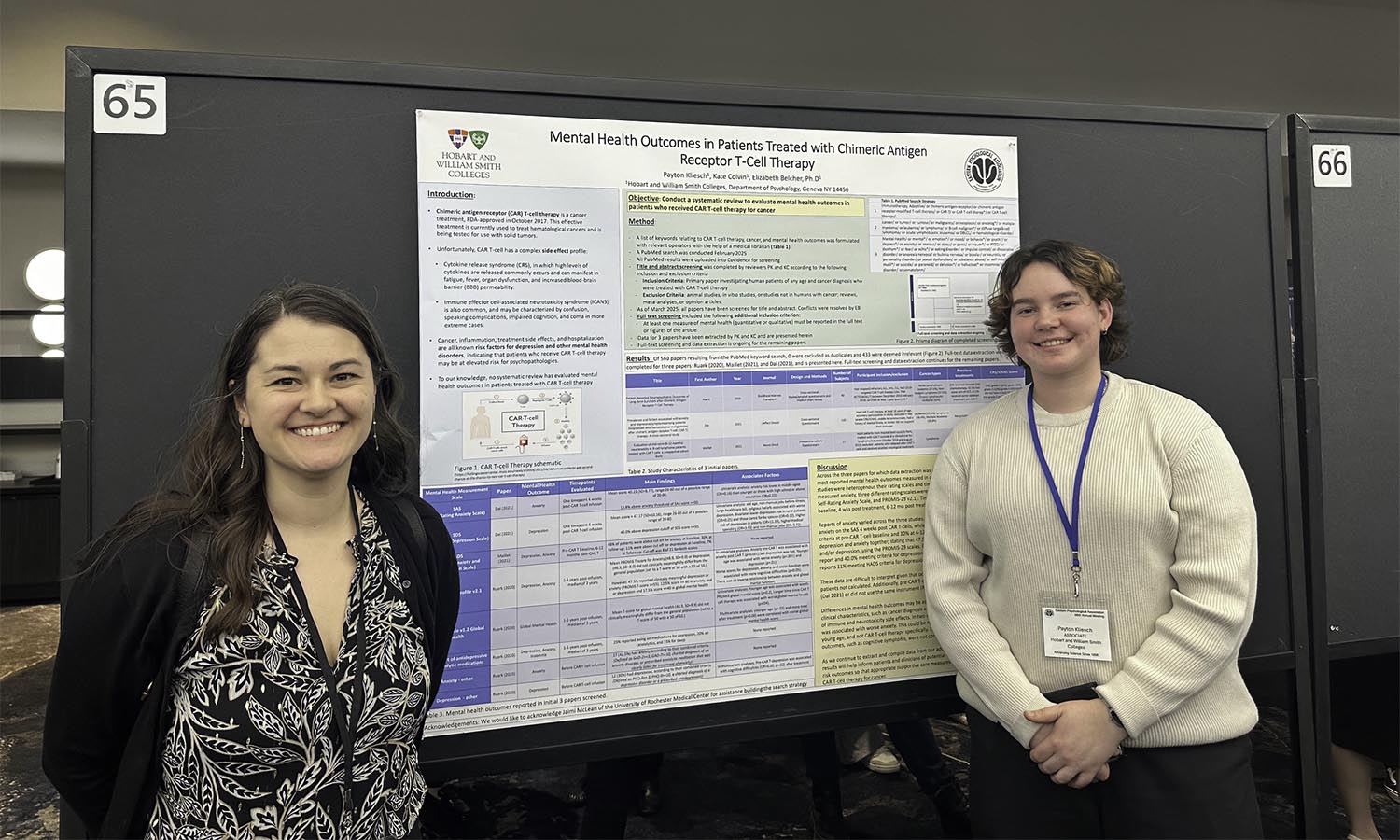 Assistant Professor of Psychological Science Elizabeth Belcher poses with Payton Kliesch '25 and Kliesch's project "Mental Health Outcomes in Patients treated with CAR T-CELL Therapy”.
Assistant Professor of Psychological Science Elizabeth Belcher poses with Payton Kliesch '25 and Kliesch's project "Mental Health Outcomes in Patients treated with CAR T-CELL Therapy”.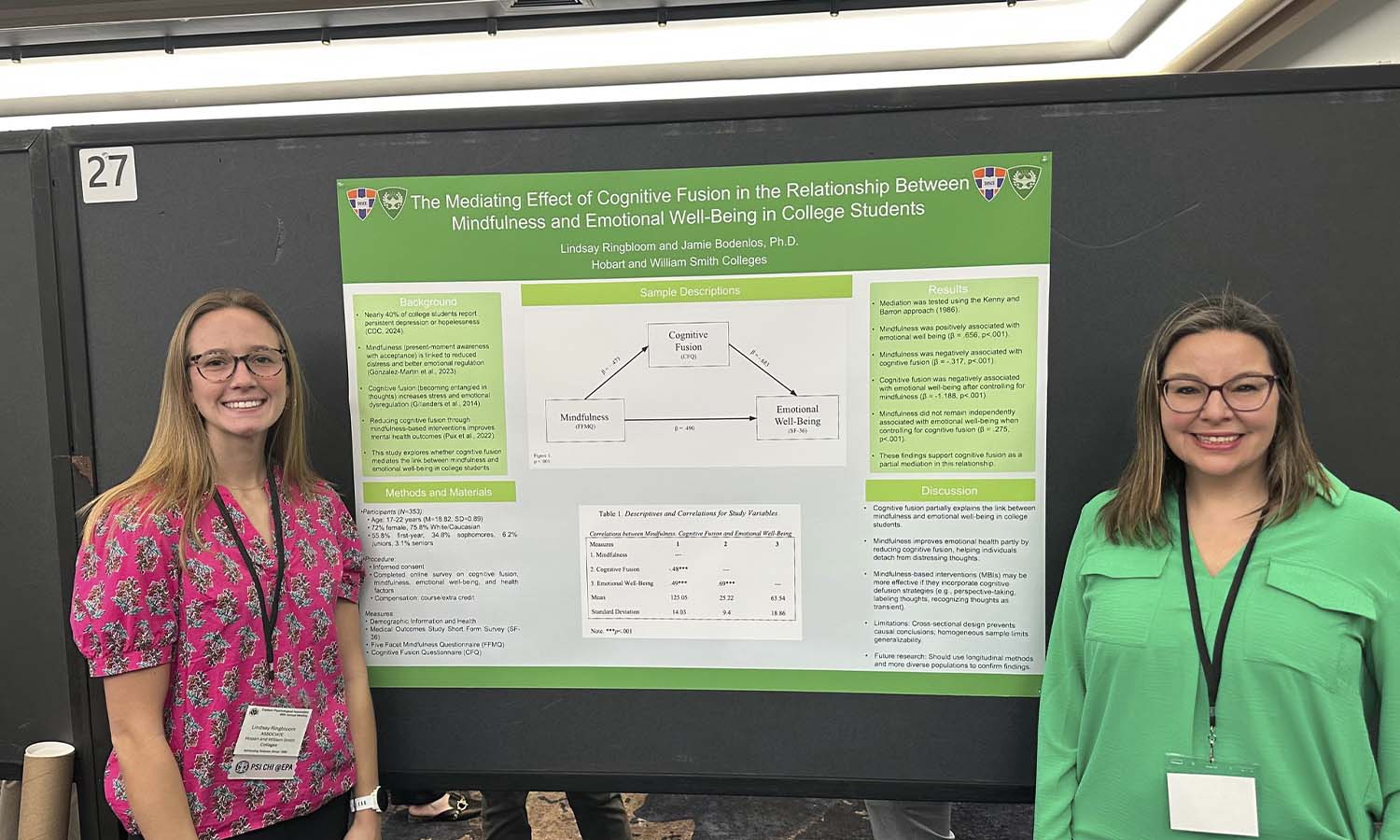 Lindsay Ringbloom '25 and Professor of Psychological Science Jamie Bodenlos with Ringbloom's project "The Mediating Effect of Cognitive Fusion in the Relationship Between Mindfulness and Emotional Well-being in College Students."
Lindsay Ringbloom '25 and Professor of Psychological Science Jamie Bodenlos with Ringbloom's project "The Mediating Effect of Cognitive Fusion in the Relationship Between Mindfulness and Emotional Well-being in College Students."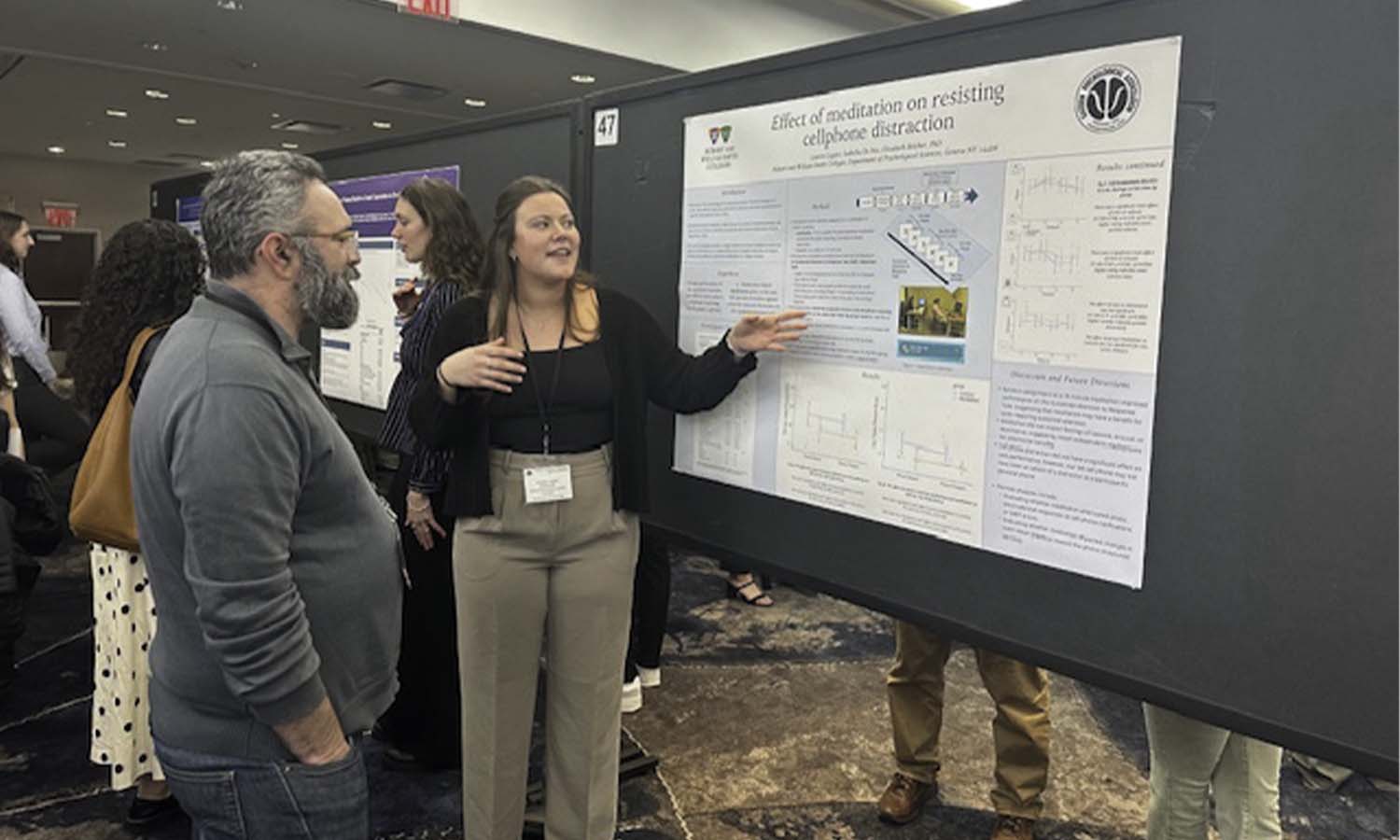 Lauren Legler '25 discusses her project "The Effect of Meditation on Resisting Cellphone Distraction."
Lauren Legler '25 discusses her project "The Effect of Meditation on Resisting Cellphone Distraction."
Legler presented research titled “Effect of Meditation on Resisting Cell Phone Distractions” which she coauthored with Belcher on a project studying the same.
“The focus of my study was whether a 10-minute guided meditation session can improve sustained attention and reduce the distraction of cell phone notifications during a cognitive task,” says Legler, noting attending her first professional conference was an amazing experience. “Not only did I have the chance to present and discuss my research with undergraduate and graduate students, but I also got to hear about their research, which was both inspiring and insightful.”
Legler also reports receiving valuable feedback on her work. “The discussions deepened my understanding of my research and allowed me to connect with representatives from various graduate programs to learn more about their programs and research opportunities,” she says.
Belcher says she enjoys her work with the students and is happy to be able to provide the opportunity for student growth.
“I think it's always valuable for students to have a taste of what it means to generate new knowledge, and attending a research conference is a great way for students to see how their work fits into the broader context of scientific progress,” she says.
Ringbloom, who worked with Bodenlos, presented “Cognitive Fusion Mediates Mindfulness and Emotional Well-being in College Students.”
“My study examined how cognitive fusion - becoming entangled in one’s thoughts - may mediate the link between mindfulness and mental health outcomes,” says Ringbloom.
Ringbloom also says attending the conference was a valuable professional experience. “It allowed me to develop my presentation skills, engage in discussions with other researchers and gain exposure to a variety of psychological studies beyond my own field of interest,” she says.
Ringbloom continues, “Since this was my first conference, it was exciting to experience the academic environment and see firsthand how psychological research is shared and discussed. And networking with professionals and fellow students gave me insight into potential graduate programs and career paths.”
Kliesch, who worked with Belcher, presented their research “Mental Health Outcomes in Patients Treated with Chimeric Antigen Receptor T-cell Therapy."
Kliesch’s study investigates mental health outcomes inpatients treated with chimeric antigen receptor (CAR)T-cell therapy, through a systematic literature review. She included database keyword searches related to mental health and CAR T-cell therapy, as well as extracting data regarding relationships between mental health outcomes and cancer stage, CAR T-cell type and dose, length of hospitalization, treatment complications, and previous treatments, when available.
“EPA was an exciting opportunity to learn about a wide range of recent research in psychology and its subfields. As someone seeking a career in research, I felt inspired to stay connected with continuing research in fields that I am not focused in and motivated to contribute to this scientific movement. It was truly special to get to present my independent research with Kate Colvin and Professor Belcher,” Kleisch says.
Ringbloom reports that one of her favorite moments from the trip was attending dinner with everyone who attended from HWS. “It was a great opportunity to connect outside of the conference setting, hear about their experiences in the field, and reflect on everything we had learned throughout the weekend,” says Ringbloom.
Bodenlos says “When I attended this conference as a member of the Psi Chi board, I realized how our students could benefit from attending. One of the reasons I took a position at a small liberal arts college was because of the opportunity to share experiences like this with students.”
Founded in 1896 to advance the science and profession of psychology, the Eastern Psychological Association hosts an annual conference that allows members to present the latest advances in the field to their colleagues.
May 2025: Following graduation, Legler will attend McGill University to pursue a master's degree in Occupational Therapy.
Top: From left: Payton Kliesch '25, Professor and Chair of Psychological Science Jamie Bodenlos, Lindsay Ringbloom ’25 Assistant Professor of Psychological Science Elizabeth Belcher, Lauren Legler '25 and Assistant Professor of Psychological Science Stephanie Anglin gather after a dinner in New York City.

